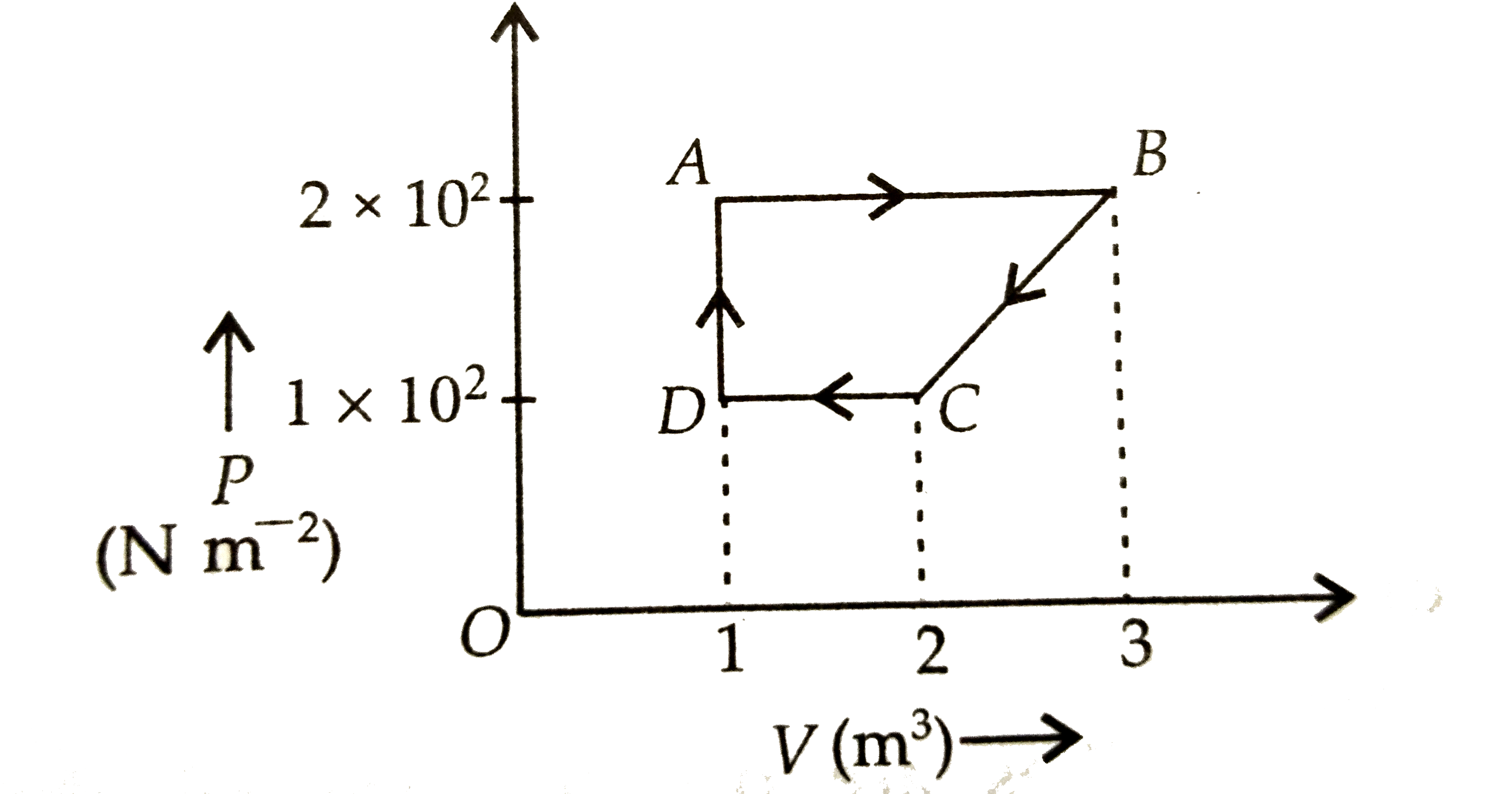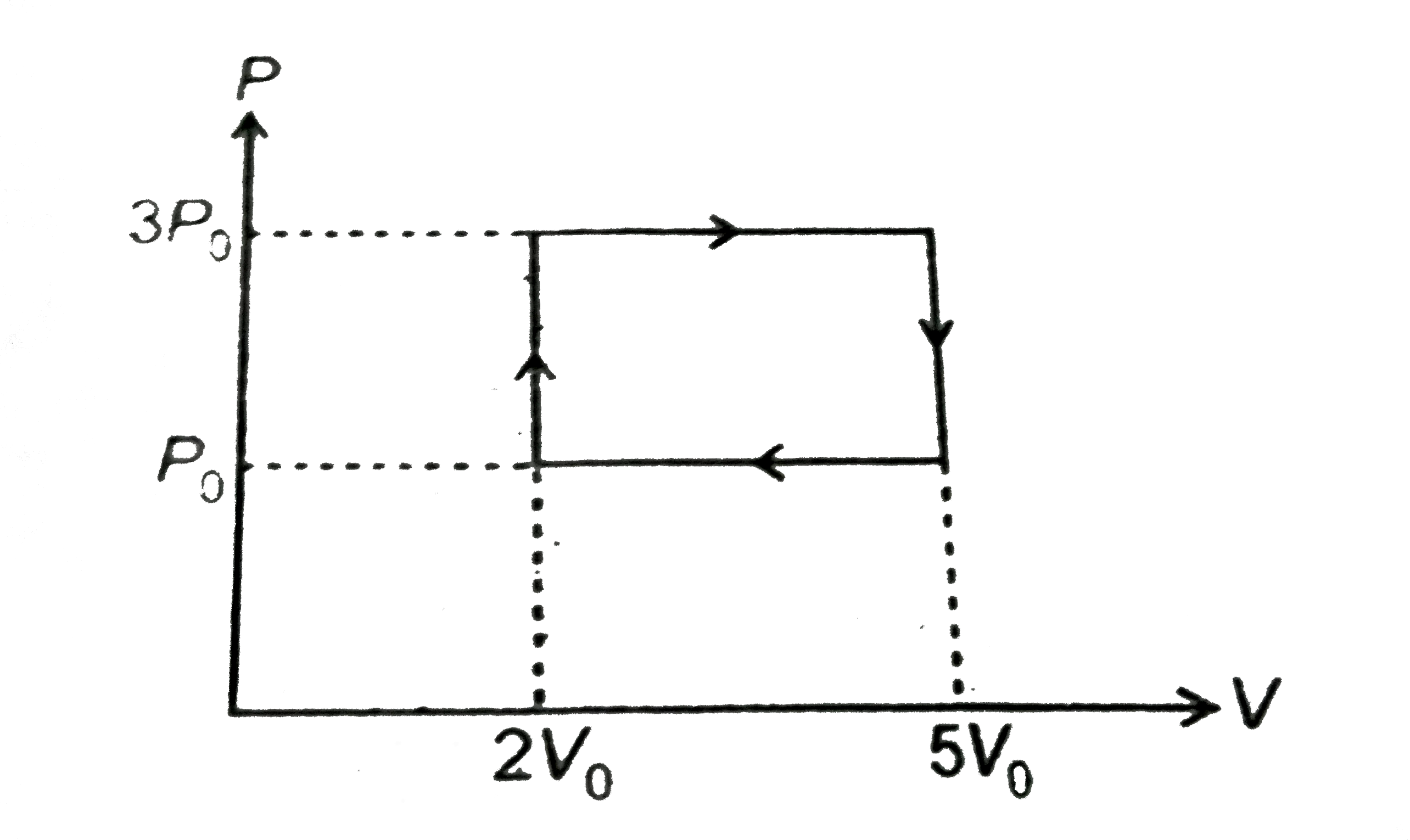Assertion: −q=−W for cyclic process.
Reason: Temperature remain constant during cyclic process.
If both Assertion & Reason are True & the Reason is a correct explanation of the Assertion.
If both Assertion & Reason are True but Reason is not a correct explanation of the Assertiion.
If Assertion is True but the Reason is False.
If both Assertion & Reason are False
The correct Answer is:C
To solve the question, we need to analyze both the assertion and the reason provided.
1. Understanding the Assertion:
The assertion states that for a cyclic process, −q=−W. In thermodynamics, this means that the heat absorbed by the system (q) is equal to the work done by the system (W).
2. Analyzing the Cyclic Process:
A cyclic process is one where the system returns to its original state after undergoing a series of changes. In such a process, the change in internal energy (ΔU) is zero because the system returns to its initial state.
3. Applying the First Law of Thermodynamics:
According to the first law of thermodynamics, we have:
ΔU=Q−W
For a cyclic process, since ΔU=0, we can write:
0=Q−W⟹Q=W
This implies that the heat added to the system is equal to the work done by the system. Therefore, we can also express this as:
−Q=−W
Thus, the assertion is correct.
4. Understanding the Reason:
The reason states that the temperature remains constant during a cyclic process. However, this is not necessarily true for all cyclic processes. While some cyclic processes (like isothermal processes) can maintain constant temperature, others (like adiabatic processes) do not. In fact, in the example of the Carnot cycle mentioned in the transcript, there are both isothermal and adiabatic processes involved, meaning the temperature does not remain constant throughout the entire cycle.
5. Conclusion:
Since the assertion is true (−q=−W for cyclic processes) but the reason is false (temperature does not remain constant in all cyclic processes), the final answer is that the assertion is true, but the reason is false.
Final Answer:
- Assertion: True
- Reason: False
The assertion states that for a cyclic process, −q=−W. In thermodynamics, this means that the heat absorbed by the system (q) is equal to the work done by the system (W).
A cyclic process is one where the system returns to its original state after undergoing a series of changes. In such a process, the change in internal energy (ΔU) is zero because the system returns to its initial state.
According to the first law of thermodynamics, we have:
ΔU=Q−W
For a cyclic process, since ΔU=0, we can write:
0=Q−W⟹Q=W
This implies that the heat added to the system is equal to the work done by the system. Therefore, we can also express this as:
−Q=−W
Thus, the assertion is correct.
The reason states that the temperature remains constant during a cyclic process. However, this is not necessarily true for all cyclic processes. While some cyclic processes (like isothermal processes) can maintain constant temperature, others (like adiabatic processes) do not. In fact, in the example of the Carnot cycle mentioned in the transcript, there are both isothermal and adiabatic processes involved, meaning the temperature does not remain constant throughout the entire cycle.
Since the assertion is true (−q=−W for cyclic processes) but the reason is false (temperature does not remain constant in all cyclic processes), the final answer is that the assertion is true, but the reason is false.
- Assertion: True
- Reason: False
Topper's Solved these Questions
- TEST PAPERBOOK - ALLENCHAPTER - TEST PAPEREXERCISE - Exercise (Chemstry)
26 Videos
- TEST PAPERBOOK - ALLENCHAPTER - TEST PAPEREXERCISE - Exercise (Chemstry)
26 Videos
- SURFACE CHEMISTRY BOOK - ALLENCHAPTER - SURFACE CHEMISTRY EXERCISE - ASSERTION & REASO
20 Videos
- TEST PAPER 1BOOK - ALLENCHAPTER - TEST PAPER 1EXERCISE - CHEMISTRY
11 Videos
Similar Questions
Knowledge Check
A cyclic process is shown in the figure. Work done during the cyclic process ABCDA is
 A1600 JB150 JC600 JD900 J
A1600 JB150 JC600 JD900 JAssertion : In an adiabatic process, change in internal energy of a gas is equal to work done on/by the gas in the process.
Reason : This is because temp.of gas remains constant in an adiabatic process.AIf both assetion and reason are true and reaasons is the correct expanation of assetionBIf both assetion and reason are tur but reason is not the correct explanation of assetionCIf assertion is true but reason is falseDIf both assertion and reason are false.
Work done in given cyclic process is

View SolutionWhat is true for a cyclic process
View SolutionWhat do you understand by cyclic process ?
View Solution
A system works under cyclic process as follow
Heat absorbed during the process is
View SolutionAssertion : For an isothermal process in an ideal gas, the heat obsorbed by the gas is entirely used in the work done by the gas.
Reason : During a process taking place in a system, the temperature remains constant then the process is isothermal.
View SolutionAssertion :- QSurr is zero for adiabatic process
Reason :- Final state of the system remains unchanged in adiabatic process.
View Solution
